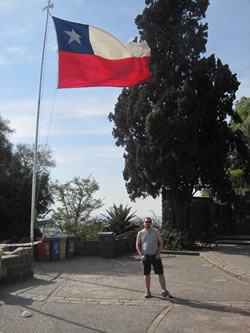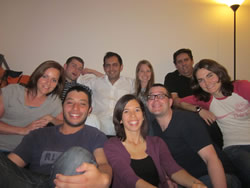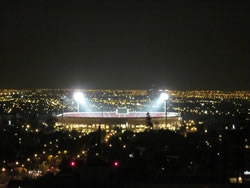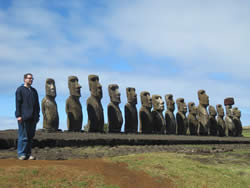- Home » Expat Articles » Interviews » Expat Interview With Daniel - US Expat Living in Chile
Expat Interview With Daniel - US Expat Living in Chile
| Published: | 10 Jun at 9 AM |
Want to get involved?
Become a Featured Expat and take our interview.
Become a Local Expert and contribute articles.
Get in touch today!
Become a Local Expert and contribute articles.
Get in touch today!
Filed: Interviews,Chile
Daniel Guim is a native of New Jersey who moved to Santiago, Chile in February 2010. He made the move not only to quench his thirst for adventure and travel but also to continue his teaching career in another part of the world. His experiences have included making new friends while traveling,celebrating Chile's bicentennial, presenting at teaching conferences, dodging teargas and watercannons on his way to work, and surviving the 2010 earthquake. Daniel's expat blog is called Adventures in South America (see listing here)
Where are you originally from?
I'm from Sewell, New Jersey, which is about 20 minutes away from Philadelphia.
In which country and city are you living now?
I am living in Santiago, Chile.
How long have you lived here and how long are you planning to stay?
I arrived on February 18th, 2010, just in time for the big earthquake on February 27th. I´m not planning on leaving any time soon, as Santiago has so many opportunities for serious professionals here.
Why did you move and what do you do?
In the States I taught kindergarten, Spanish, and German, but I found the work very draining. Large class sizes, unsupportive administration when it came to discipline issues, and challenging students and parents took a toll on me. Due to the economy I was laid off for three years in a row, and I decided that I wanted a change. I loved my time abroad in Germany and Spain, and I also really enjoyed traveling to Mexico and around Europe. I also knew that I didn't want to give up teaching. In June 2009 I decided I wanted that spirit of adventure and travel again and made the decision to move to Chile.
I´m a language professional here in Santiago. I currently work with an institute called Eclass, teaching business English classes to professionals. The majority of my work, however, comes from freelance classes with adults and children. In addition to English and German classes, I have done translations, interpreting, and workshops for both new and experienced teachers in Chile.
Did you bring family with you?
No, I came to Chile on my own.
How did you find the transition to living in a foreign country?
I think my experience was much like that of the typical transition to living in another country. I went through a honeymoon phase where everything was new and exciting, but after that wore off I started feeling irritated and annoyed by the things I didn´t like here. I felt really homesick and unhappy, but I knew that I didn´t want to return home or leave Chile. I went through some really challenging situations in regards to my work and financial difficulties, but with the help of some great friends and believing that things would work out things are much better now.
I still experience ups and downs as I live in a culture that is completely different than mine, but I feel that those ups and downs are natural and a part of living anywhere.
Was it easy making friends and meeting people; do you mainly socialise with other expats?
I came to Chile through a program called TeachingChile, and there were a lot of other people in the same situation. We were placed in the same hostel upon arrival, and so we got to know each other really well. I'm still friends with some of them, and some of them are also still here in Chile. I also got to know Chileans through roommates and going out to social events.
It´s not that difficult to get to meet people here in Santiago. Chileans are warm and welcoming people, but maintaining friendships is a bit challenging. Families are very close in Chile, and the entire day Sunday is usually spent with the family. In addition, children here go to school with the same exact group of students from kindergarten to cuarto medio (our equivalent of 12th grade). They develop strong bonds with their school and university friends. For those reasons, it can be a bit difficult to become part a social circle of Chileans that is already well established.
In the end, I find myself spending about 75% of my time with expats and 25% with Chileans.
What are the best things to do in the area; anything to recommend to future expats?
Santiago is a huge city, and there are tons of things to do. Restaurants, bars, museums, and cultural events are just a few of the things. Once you arrive and join a few Facebook interest groups, you will find that there is always something going on. It all depends on your interest.
One of my personal favorites is meeting up with a friend or small group of friends and walking up to Cerro San Cristobal. It's a huge hill that has an amazing view and some delicious empanadas at the top. The walk up is about an hour and a half if you take your time, and it's nice to talk about life with someone on the way up.
What do you enjoy most about living here?
This might sound a bit silly, but I love that I don't need a car here. Santiago has an extensive public transportation system with both buses and subway, and so you can get around quickly and easily without a car. I don't drink much, but it's a nice feeling knowing that I can have a few drinks and get home safely Taxis also aren't that expensive here, and so after a night out you can get a taxi home for a reasonable price. My only recommendation is to avoid the rush hour traffic (about 7:30 to 9:00 in the morning and 6:00 to 7:30 at night) whenever possible.
How does the cost of living compare to home?
Well, this is actually an interesting question.
Given that I don't need a car here, my expenses are much less than they would be in the States. I have been fortunate to find a wonderful one bedroom apartment with very affordable rent before prices on rent began shooting up about two years ago, so my situation is perhaps not typical compared to other expats living in Santiago.
To give you an idea, a liter of milk her is about 600 pesos, or about $1.20. Fruit and vegetables are cheaper, and I can usually get a kilo (over two pounds) of strawberries in season for 1000 pesos, or $2. Wine is much cheaper here, and for about 3000 pesos ($6) you can get a nice bottle. There are bottles of wine that are less than 2000 pesos ($4), and they are still very good quality. I usually spend about 125,000 pesos (about $250) on groceries per month.
A ride on the buses or metro will cost about 600 pesos. While it doesn't sound like much, it can add up quickly. I usually spend about 40,000 pesos on transportation in a given month due to having to travel around for my classes.
It fluctuates per month, but I usually spend about $500,000 pesos ($1000) to cover my rent, food, utilities, wireless internet, eating out, entertainment, health insurance, and miscellaneous expenses.
What negatives, if any, are there to living here?
Santiago is a bit city, and if you come alone it can be a bit daunting getting established and finding work.
Additionally, working as an English teacher has its own unique set of challenges. Most work here is through institutes, and you are paid hourly. An institute might only have one or two classes for you when you start working, and given that classes are usually two to three hours a week you will need much more than that to make ends meet here. It's common that people come and have to work between two, three, or even four institutes to have a full schedule of classes.
If you could pick one piece of advice to anyone moving here, what would it be?
I actually have to cheat on this one and give two pieces of advice, but they go hand in hand. The first would be to do as much research and contact as many people as you can before arriving. If I had done more of this, my experience would have been much smoother and I would have been much more prepared for the challenges I faced during my first few years in Chile.
The second piece of advice is to always have a Plan B and Plan C in mind. People are not always as honest as you would expect them to be about job opportunities and working conditions in Chile, and things don't always work out as you would expect them to. For that reason, always have a backup plan in place.
What has been the hardest aspect to your expat experience so far?
I think the hardest part has been coming to the realization that you have to be much less trusting of people down here than when I was when I first came down. It's not nice to say, but in Chile there is a general culture of taking advantage of foreigners. (This isn't limited to Chileans doing this. Established foreigners will sadly also do the same). This can be in small ways like taxis ripping you off, or more serious matters such as landlords not returning security deposits or employers violating work contracts and not informing foreigners of their rights.
What are your top 5 expat tips for anyone following in your footsteps?
Tell us a bit about your own expat blog.
My blog tells about my adventures teaching English in Santiago and traveling around South America. I actually started it before I left, and I plan on updating on a regular basis.
How can you be contacted for further advice to future expats coming to your area?
I can be contacted via my blog.
Daniel blogs at http://gringoinsouthamerica.blogspot.com which we recommend a quick visit if you haven't been already. Adventures in South America has an ExpatsBlog.com listing here so add a review if you like! If you appreciated this interview with Daniel, please also drop him a quick comment below.
Here's the interview with Daniel...
Where are you originally from?
I'm from Sewell, New Jersey, which is about 20 minutes away from Philadelphia.
In which country and city are you living now?
I am living in Santiago, Chile.
How long have you lived here and how long are you planning to stay?
I arrived on February 18th, 2010, just in time for the big earthquake on February 27th. I´m not planning on leaving any time soon, as Santiago has so many opportunities for serious professionals here.
Why did you move and what do you do?
In the States I taught kindergarten, Spanish, and German, but I found the work very draining. Large class sizes, unsupportive administration when it came to discipline issues, and challenging students and parents took a toll on me. Due to the economy I was laid off for three years in a row, and I decided that I wanted a change. I loved my time abroad in Germany and Spain, and I also really enjoyed traveling to Mexico and around Europe. I also knew that I didn't want to give up teaching. In June 2009 I decided I wanted that spirit of adventure and travel again and made the decision to move to Chile.
I´m a language professional here in Santiago. I currently work with an institute called Eclass, teaching business English classes to professionals. The majority of my work, however, comes from freelance classes with adults and children. In addition to English and German classes, I have done translations, interpreting, and workshops for both new and experienced teachers in Chile.
Did you bring family with you?
No, I came to Chile on my own.
How did you find the transition to living in a foreign country?
I think my experience was much like that of the typical transition to living in another country. I went through a honeymoon phase where everything was new and exciting, but after that wore off I started feeling irritated and annoyed by the things I didn´t like here. I felt really homesick and unhappy, but I knew that I didn´t want to return home or leave Chile. I went through some really challenging situations in regards to my work and financial difficulties, but with the help of some great friends and believing that things would work out things are much better now.
I still experience ups and downs as I live in a culture that is completely different than mine, but I feel that those ups and downs are natural and a part of living anywhere.
Was it easy making friends and meeting people; do you mainly socialise with other expats?
I came to Chile through a program called TeachingChile, and there were a lot of other people in the same situation. We were placed in the same hostel upon arrival, and so we got to know each other really well. I'm still friends with some of them, and some of them are also still here in Chile. I also got to know Chileans through roommates and going out to social events.
It´s not that difficult to get to meet people here in Santiago. Chileans are warm and welcoming people, but maintaining friendships is a bit challenging. Families are very close in Chile, and the entire day Sunday is usually spent with the family. In addition, children here go to school with the same exact group of students from kindergarten to cuarto medio (our equivalent of 12th grade). They develop strong bonds with their school and university friends. For those reasons, it can be a bit difficult to become part a social circle of Chileans that is already well established.
In the end, I find myself spending about 75% of my time with expats and 25% with Chileans.
What are the best things to do in the area; anything to recommend to future expats?
Santiago is a huge city, and there are tons of things to do. Restaurants, bars, museums, and cultural events are just a few of the things. Once you arrive and join a few Facebook interest groups, you will find that there is always something going on. It all depends on your interest.
One of my personal favorites is meeting up with a friend or small group of friends and walking up to Cerro San Cristobal. It's a huge hill that has an amazing view and some delicious empanadas at the top. The walk up is about an hour and a half if you take your time, and it's nice to talk about life with someone on the way up.
What do you enjoy most about living here?
This might sound a bit silly, but I love that I don't need a car here. Santiago has an extensive public transportation system with both buses and subway, and so you can get around quickly and easily without a car. I don't drink much, but it's a nice feeling knowing that I can have a few drinks and get home safely Taxis also aren't that expensive here, and so after a night out you can get a taxi home for a reasonable price. My only recommendation is to avoid the rush hour traffic (about 7:30 to 9:00 in the morning and 6:00 to 7:30 at night) whenever possible.
How does the cost of living compare to home?
Well, this is actually an interesting question.
Given that I don't need a car here, my expenses are much less than they would be in the States. I have been fortunate to find a wonderful one bedroom apartment with very affordable rent before prices on rent began shooting up about two years ago, so my situation is perhaps not typical compared to other expats living in Santiago.
To give you an idea, a liter of milk her is about 600 pesos, or about $1.20. Fruit and vegetables are cheaper, and I can usually get a kilo (over two pounds) of strawberries in season for 1000 pesos, or $2. Wine is much cheaper here, and for about 3000 pesos ($6) you can get a nice bottle. There are bottles of wine that are less than 2000 pesos ($4), and they are still very good quality. I usually spend about 125,000 pesos (about $250) on groceries per month.
A ride on the buses or metro will cost about 600 pesos. While it doesn't sound like much, it can add up quickly. I usually spend about 40,000 pesos on transportation in a given month due to having to travel around for my classes.
It fluctuates per month, but I usually spend about $500,000 pesos ($1000) to cover my rent, food, utilities, wireless internet, eating out, entertainment, health insurance, and miscellaneous expenses.
What negatives, if any, are there to living here?
Santiago is a bit city, and if you come alone it can be a bit daunting getting established and finding work.
Additionally, working as an English teacher has its own unique set of challenges. Most work here is through institutes, and you are paid hourly. An institute might only have one or two classes for you when you start working, and given that classes are usually two to three hours a week you will need much more than that to make ends meet here. It's common that people come and have to work between two, three, or even four institutes to have a full schedule of classes.
If you could pick one piece of advice to anyone moving here, what would it be?
I actually have to cheat on this one and give two pieces of advice, but they go hand in hand. The first would be to do as much research and contact as many people as you can before arriving. If I had done more of this, my experience would have been much smoother and I would have been much more prepared for the challenges I faced during my first few years in Chile.
The second piece of advice is to always have a Plan B and Plan C in mind. People are not always as honest as you would expect them to be about job opportunities and working conditions in Chile, and things don't always work out as you would expect them to. For that reason, always have a backup plan in place.
What has been the hardest aspect to your expat experience so far?
I think the hardest part has been coming to the realization that you have to be much less trusting of people down here than when I was when I first came down. It's not nice to say, but in Chile there is a general culture of taking advantage of foreigners. (This isn't limited to Chileans doing this. Established foreigners will sadly also do the same). This can be in small ways like taxis ripping you off, or more serious matters such as landlords not returning security deposits or employers violating work contracts and not informing foreigners of their rights.
What are your top 5 expat tips for anyone following in your footsteps?
- Do as much research and make as many connections as possible before leaving. There are plenty of people out there that are willing to help and share their experience, and if the person you contact can't help you, they probably know someone that can. In February 2011 a stranger (but now good friend) posted on my blog telling me she wanted to come to Chile, and so we started communicating via email. She then came down the following year, and we met in person and have since become good friends.
- Don't sign a work contract or pay money for a job before arriving. It's very easy for an individual or company to make promises about pay and working conditions when you are thousands of miles away, but from my personal experiences and hearing the experiences of others things rarely work out to be as wonderful as they are portrayed. If you arrive with contacts already made, you can then interview in person and get a feel for what job or company is best suited for you. You can probably also talk to current employees outside of the office and ask for their opinion about working there, leaving you to make a much more informed decision.
- Bring a hobby with you. I'm a fan of Magic: The Gathering, a card-based role playing game. Before arriving I found out that Magic was also very popular in Chile, so I brought my cards down with me. I also found the names of two people that organized tournaments, and so I wrote them an email explaining that I was moving to Santiago and wanted to play Magic. One of them wrote back telling me the name of two stores where they sell cards and where people regularly meet to play. I made some friends and also got to practice my Spanish while practicing a hobby from home.
- Learn the language. I was fortunate to already speak Spanish before arriving, but Chilean Spanish is full of slang and is spoken very quickly. I was at an advantage when things went sour with an employer in that I was able to communicate directly with them about it. I was also able to go out and make friends with natives without a problem, and I was also able to negotiate rates and conditions for private classes with students that didn't speak any English. If it's not possible to learn the language beforehand, take advantage of opportunities to meet with Spanish speakers to do language exchanges and practice.
- Enjoy the experience! Living abroad is an amazing time to start a new adventure in your life. You will be challenged in the ways you think and act, and you will go through ups and downs. You will grow in so many ways, and you will have opportunities to go out and do things you've never done before. It can be scary to take the step of getting on the plane, but once you do it you've taken the first step of starting a new and exciting chapter of your life.
Tell us a bit about your own expat blog.
My blog tells about my adventures teaching English in Santiago and traveling around South America. I actually started it before I left, and I plan on updating on a regular basis.
How can you be contacted for further advice to future expats coming to your area?
I can be contacted via my blog.
Daniel blogs at http://gringoinsouthamerica.blogspot.com which we recommend a quick visit if you haven't been already. Adventures in South America has an ExpatsBlog.com listing here so add a review if you like! If you appreciated this interview with Daniel, please also drop him a quick comment below.
Grab a featured expat badge that links to this interview!
 Copy and paste code to display the Featured Expat Badge:
Copy and paste code to display the Featured Expat Badge:Comments » There is 1 comment

Rosie wrote 11
years ago:
Thank you Daniel for your honesty. Looking forward to arriving in Chile in Nov and you motivated me to start my spanish lessons soon. Loved the idea of bringing your hobby along. Cheers!









